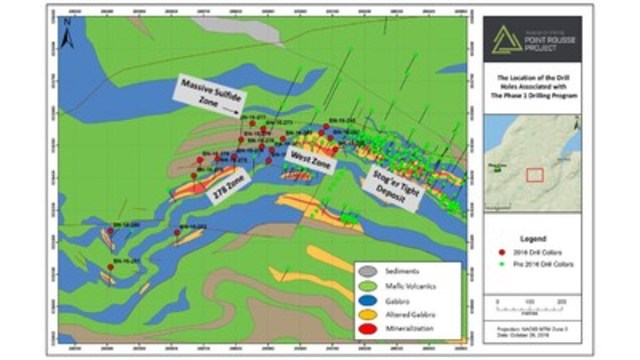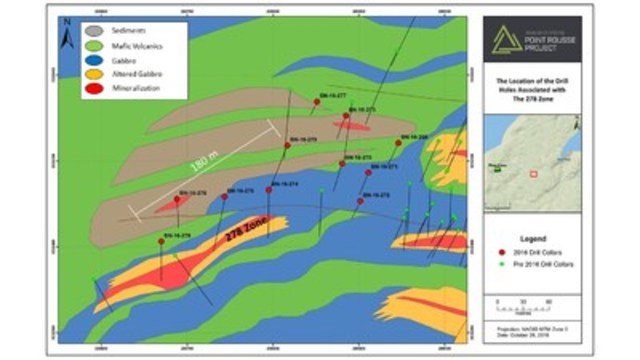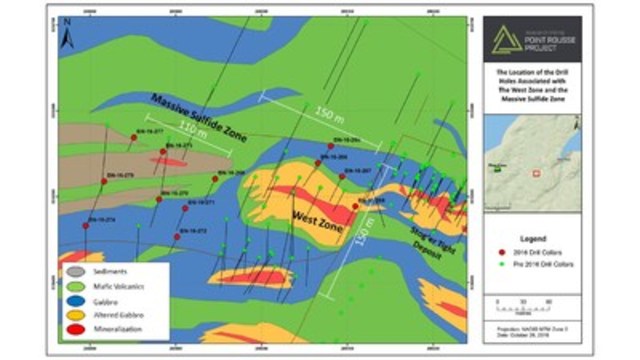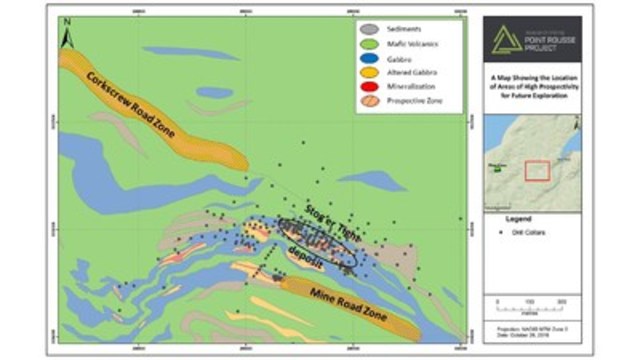
TORONTO, Oct. 27, 2016 /CNW/ - Anaconda Mining Inc. ("Anaconda"
or the "Company") – (TSX: ANX) is pleased to announce the results of a recently completed 19-hole, 1,347-metre diamond drilling
program (the "Phase 1 Drilling Program") near the Stog'er Tight deposit and approximately 3.5 kilometres from the Pine Cove Mill,
focused along a southwestern strike of 850 metres and a width of 300 metres (the "Stog'er Tight Extension Area"), within the Point
Rousse Project (See Exhibit A). The results of the Phase 1 Drill Program indicate that key targets of mineralization exist
near surface at three areas to the west and southwest of the Stog'er Tight deposit - the 278 Zone, the West Zone and the
Massive Sulfide Zone. The Company also identified two new, prospective areas referred to as the Corkscrew Road and Mine Road
zones that contain future drill targets.
Dustin Angelo, CEO of Anaconda, states, "The goal of the Phase 1 Drilling Program was to test
certain targets in the Stog'er Tight Extension Area to determine if mineralization exposed at surface extends to depth. We were
successful in extending the strike length and dip extent at the West Zone and discovering a new zone called the 278 Zone. The
Massive Sulfide Zone is also intriguing as it has led to a potentially larger target in the Corkscrew Road zone. The Stog'er Tight
project as a whole continues to grow, albeit at a slower pace than expected. We are encouraged by the prospectivity of these zones
and targets to increase resources and will incorporate them in our future exploration plans."
The 278 Zone
The 278 Zone (formerly known as the Gabbro West Extension) refers to a zone of near surface, Stog'er Tight style mineralization
located between approximately 280 and 550 metres west-southwest of the Stog'er Tight deposit (Exhibit B). Anaconda designed
eight drill holes to test mineralization at surface that was previously identified through historical prospecting, geological
mapping and limited diamond drilling. Of the eight drill holes, six intersected mineralization and alteration. The diamond drill
results demonstrated that the 278 Zone extends at least 180 metres along strike (between holes BN-16-278 and BN-16-279) and 80
metres down dip from surface. The zone remains open to the southwest and further drilling between widely spaced holes is
warranted at shallow depths. Highlights of the Phase 1 Drilling Program testing the 278 Zone are shown below:
|
Hole ID
|
From (m)
|
To (m)
|
Interval (m)
|
Gold g/t
|
|
BN-16-276
|
29.0
|
33.0
|
4.0
|
1.13
|
|
BN-16-278
|
21.0
|
29.8
|
8.8
|
1.28
|
|
BN-16-279
|
49.9
|
52.9
|
3.0
|
3.81
|
The West Zone
The West Zone (Exhibit C), which has been previously drilled (see press release of June 2, 2016)
is adjacent to the Stog'er Tight deposit and is thought to be the faulted offset and western extension of the deposit. Prior to the
Phase 1 Drilling Program, the strike length and the dip extent of the West Zone (including the Gabbro zone as reported on
June 2, 2016) were approximately 100 metres and 130 metres, respectively. During the Phase 1 Drilling
Program, Anaconda tested the extents of the West Zone with 8 diamond drill holes (BN-16-265 to BN-16-272), of which five holes
intersected mineralization and alteration. The results of the program indicate that the mineralization within the West Zone
extend farther westward at least 50 metres along strike and at least 40 metres down dip to the north. The West Zone now has a
dip extent of approximately 150 metres and a strike extent of approximately 150 metres and is generally within 50 metres of
surface. Between the West Zone and the Stog'er Tight deposit, the combined strike length is approximately 550 metres. Highlights
from Phase 1 Drilling Program for the West Zone are shown in the table below:
|
Hole ID
|
From (m)
|
To (m)
|
Interval (m)
|
Gold (g/t)
|
|
BN-16-265
|
28.7
|
33.0
|
4.3
|
1.20
|
|
BN-16-266
|
27.6
|
31.8
|
4.2
|
1.61
|
|
BN-16-269*
|
47.7
|
49.5
|
1.8
|
3.93
|
|
*Hole BN-16-269: Mineralization discovered in the bottom portion of the drill
hole is hosted by the Stog'er Tight gabbro.
|
|
The Massive Sulfide, Corkscrew Road and the Mine Road Zones
The Massive Sulfide Zone (Exhibit C) is located in the Stog'er Tight Extension Area approximately 250 metres west of the Stog'er
Tight deposit and is characterized by the presence of an iron formation, which is different than the typical gabbro hosted
mineralization seen in other parts of Stog'er Tight Extension Area. Anaconda tested the extent of the Massive
Sulfide Zone with three diamond drill holes (BN-16-269 (top portion), -273, -277). The three holes, plus a fourth historic
hole (BN-88-08) drilled in the area, intersected the iron formation with associated sulfides containing widths of 2.0 to 3.4 metres
over a strike length of 150 metres near surface. Hole BN-88-08 intersected mineralization of 3.10 g/t over 1.0 metre and hole
BN-16-273 intersected mineralization of 2.10 g/t over 1.3 metres.
More significantly, an iron formation trends northwestwardly, for approximately a kilometre, away from the Stog'er Tight
Extension Area (Exhibit D). Anaconda believes the iron formation trend, referred to as the Corkscrew Road Zone, may be the
northwesterly continuation of the Massive Sulfide Zone. Based on historical data the Corkscrew Road Zone is also host to a
convergence of anomalous gold-in-soil anomalies and a series of chargeability anomalies. Coincident gold-in-soil and
chargeability anomalies such as these are also characteristics of both the Pine Cove and Stog'er Tight deposits. The
Corkscrew Road Zone has not been previously drilled. Anaconda expects to include it in its future exploration plans.
In addition, Anaconda has other prospective drill targets adjacent to the Stog'er Tight deposit in an area referred to as the
Mine Road Zone (Exhibit D). It is characterized by the easterly continuation of a Stog'er Tight gabbro, which is coincident
with a string of ground IP – chargeability anomalies. The Mine Road Zone has not previously been explored by drilling and
Anaconda expects to include it in its future exploration plans as well.
A table showing all significant drill intersections from the overall Phase 1 Drilling Program are given below:
|
Hole ID
|
From (m)
|
To (m)
|
Interval (m)
|
Au g/t
|
|
BN-16-265
|
28.7
|
33.0
|
4.3
|
1.20
|
|
BN-16-266
|
27.6
|
31.8
|
4.2
|
1.61
|
|
BN-16-268
|
4.9
|
6.0
|
1.1
|
0.78
|
|
BN-16-269
|
31.0
|
32.0
|
1.0
|
0.89
|
|
and
|
47.7
|
49.5
|
1.8
|
3.93
|
|
and
|
53.5
|
54.5
|
1.0
|
1.00
|
|
BN-16-271
|
16.0
|
16.8
|
0.8
|
0.50
|
|
BN-16-273
|
53.0
|
54.3
|
1.3
|
2.10
|
|
BN-16-275
|
26.0
|
30.0
|
4.0
|
0.56
|
|
BN-16-276
|
29.0
|
33.0
|
4.0
|
1.13
|
|
BN-16-278
|
21.0
|
29.8
|
8.8
|
1.28
|
|
including
|
25.0
|
29.8
|
4.8
|
1.82
|
|
including
|
25.0
|
26.0
|
1.0
|
5.91
|
|
BN-16-279
|
49.9
|
52.9
|
3.0
|
3.81
|
|
BN-16-281
|
27.7
|
30.0
|
2.3
|
1.46
|
Table 1. A table of significant drill intercepts encountered during the Phase 1 Drilling Program at Stog'er Tight.
Holes BN-16-267, BN-16-270, BN-16-272, BN-16-272, BN-16-274, BN-16-277,BN-16-280 and BN-16-282 did not intersect significant
mineralization.
Overview of the Stog'er Tight Deposit
The Stog'er Tight Deposit is located 3.5 km from the Pine Cove mill along the existing mine road. The Deposit contains a
43-101-compliant resource, including an Indicated Resource of 204,100 tonnes with a grade of 3.59 g/t Au (23,540 oz Au) and an
Inferred Resource of 252,000 tonnes with a grade of 3.27 g/t Au (26,460 oz Au) using a cut-off grade of 0.8 g/t Au (see Company's
news release dated October 22, 2015). The Deposit is characterized by intense carbonate, albite, and
pyrite alteration of gabbroic rocks with gold, strongly associated with pyrite, which is like the Pine Cove Deposit. The
geological characteristics of Stog'er Tight are found in a much larger area around the Deposit that is approximately 1.5 km long by
0.5 km wide.
This news release has been reviewed and approved by Paul McNeill, P. Geo., VP Exploration with
Anaconda Mining Inc., a "Qualified Person", under National Instrument 43-101 Standard for Disclosure for Mineral Projects.
All quoted drill intervals are not necessarily true widths and are estimated to be 70 to 100% of true thickness.
All samples are collected using QA/QC protocols including the regular insertion of duplicates, standards and blanks within
the sample batch for analysis. All samples quoted in this release are analyzed at Eastern Analytical Ltd. in Springdale, NL, for Au by fire assay (30g) with an AA finish.
ABOUT ANACONDA MINING
Anaconda Mining is a growth-oriented, gold mining and exploration company with a producing project called the Point Rousse
Project and an exploration/development project called the Viking Project in Newfoundland.
The Point Rousse Project is approximately 6,300 hectares of property on the Ming's Bight Peninsula located in the Baie Verte
Mining District in Newfoundland, Canada. Since 2012, Anaconda has increased its property control
by ten-fold on the peninsula and gold production to approximately 16,000 ounces per year. In an effort to expand production, it is
currently exploring three primary, prospective gold trends, which have approximately 20 kilometres of cumulative strike length and
include five deposits and numerous prospects and showings, all within 8 kilometres of the Pine Cove Mill.
Anaconda also controls the Viking Project, which has approximately 6,225 hectares of property in White Bay, Newfoundland, approximately 100 kilometres by water (180 kilometres via road) from the Pine Cove Mill. The
project contains the Thor Deposit and other gold prospects and showings. The Company's plan is to discover and develop more
resources within these project areas and substantially increase annual production at the Pine Cove Mill from its current rate of
approximately 16,000 ounces.
As the only pure play gold producer in Atlantic Canada, Anaconda Mining is turning the rock we
live on into a growing and profitable resource. With a young and motivated workforce, innovative technology and the support of
local suppliers, Anaconda is investing in the people of Newfoundland & Labrador and giving
back to the communities in which we operate – building a better future for all our stakeholders, from the ground up.
FORWARD-LOOKING STATEMENTS
This document contains or refers to forward-looking information. Such forward-looking information includes, among other
things, statements regarding targets, estimates and/or assumptions in respect of future production, mine development costs, unit
costs, capital costs, timing of commencement of operations and future economic, market and other conditions, and is based on
current expectations that involve a number of business risks and uncertainties. Factors that could cause actual results to differ
materially from any forward-looking statement include, but are not limited to: the final approval of the private placement by the
Toronto Stock Exchange; the grade and recovery of ore which is mined varying from estimates; capital and operating costs varying
significantly from estimates; inflation; changes in exchange rates; fluctuations in commodity prices; delays in the development of
the any project caused by unavailability of equipment, labour or supplies, climatic conditions or otherwise; termination or
revision of any debt financing; failure to raise additional funds required to finance the completion of a project; and other
factors. Additionally, forward-looking statements look into the future and provide an opinion as to the effect of certain events
and trends on the business. Forward-looking statements may include words such as "plans," "may," "estimates," "expects,"
"indicates," "targeting," "potential" and similar expressions. These forward-looking statements, including statements regarding
Anaconda's beliefs in the potential mineralization, are based on current expectations and entail various risks and uncertainties.
Forward-looking statements are subject to significant risks and uncertainties and other factors that could cause actual results to
differ materially from expected results. Readers should not place undue reliance on forward-looking statements. These
forward-looking statements are made as of the date hereof and we assume no responsibility to update them or revise them to reflect
new events or circumstances, except as required by law.
SOURCE Anaconda Mining Inc.



Image with caption: "Exhibit A: A geological map of the Stog'er Tight area showing the location of surface mineralization (red)
of the Stog'er Tight area as reported in this press release and the location of drill collars referenced (shown in red) in this
news release. (CNW Group/Anaconda Mining Inc.)". Image available at: http://photos.newswire.ca/images/download/20161027_C4964_PHOTO_EN_805431.jpg
Image with caption: "Exhibit B: A geological map of the 278 Zone showing the location of mapped surface mineralization and
alteration as well as the location of drill collars referenced in this news release. (CNW Group/Anaconda Mining Inc.)". Image
available at: http://photos.newswire.ca/images/download/20161027_C4964_PHOTO_EN_805429.jpg
Image with caption: "Exhibit C: A geological map of the West and Massive Sulfide Zones showing the mapped surface mineralization
and alteration as well as the location of drill collars referenced in this news release. (CNW Group/Anaconda Mining Inc.)". Image
available at: http://photos.newswire.ca/images/download/20161027_C4964_PHOTO_EN_805427.jpg
Image with caption: "Exhibit D: A geological map of the area near Stog'er Tight showing the areas of prospectivity including the
Corkscrew and Mine Road zones as targets for future exploration programs. (CNW Group/Anaconda Mining Inc.)". Image available at:
http://photos.newswire.ca/images/download/20161027_C4964_PHOTO_EN_805425.jpg
